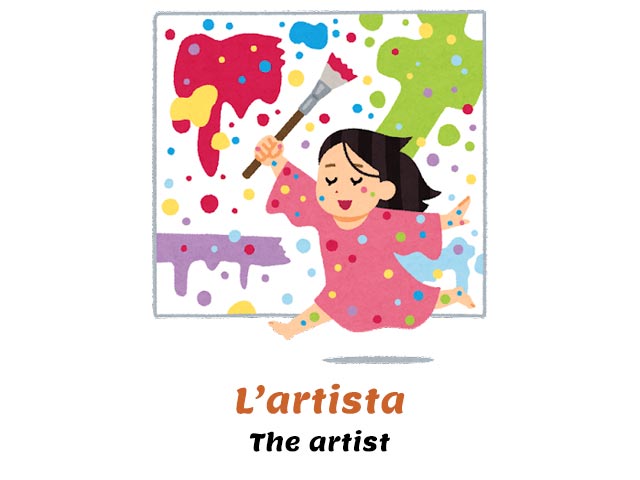How to spot feminine nouns in Italian
As you probably already know, Italian nouns can be either masculine or feminine.
Usually, nouns for males and masculine animals are masculine, while nouns for females and feminine animals are feminine.
Donna and bambina, for example, are feminine.
Donna
Woman
Bambina
Female kid
And uomo and bambino are masculine.
Uomo
Man
Bambino
Male kid
For all other nouns, it’s not nature that determines gender. It’s grammar itself. In most cases, you can guess the gender of an Italian noun by its last letter, which makes Italian feminine nouns easy to recognize. Let’s see why.
Italian feminine nouns ending in -a
The vast majority of Italian feminine nouns end in -a. Very few masculine nouns end in -a.
In Italian, feminine nouns are usually preceded by a feminine definite article or a feminine indefinite article.
| Feminine noun | English |
|---|---|
| Finestra | Window |
| Chiesa | Church |
| Bottiglia | Bottle |
| Foglia | Leaf |
| Carta | Paper |
| Maschera | Mark |
| Luna | Moon |
La finestra è aperta.
The window is open.
C’è una bottiglia sul tavolo.
There’s a bottle on the table.
La luna è piena stasera.
The moon is full tonight.

Feminine nouns ending in -e
Italian nouns ending in -e be either masculine or feminine, and some are indistinguishable.
Tigre
Tiger
Would you be able to tell if tigre is masculine or feminine?
In fact, one of the nouns you saw right at the beginning of this article is a masculine noun: colore.
We say la tigre, with a feminine article, because the noun is feminine.
And we say il colore, with a masculine article, because the noun is masculine.
Other feminine nouns ending in -e are…
| Feminine noun | English |
|---|---|
| Lince | Lynx |
| Prigione | Prison |
| Rete | Net |
| Chiave | Key |
| Fame | Hunger |
La prigione è qui vicino.
The prison is nearby.
I pesci cadono nella rete.
The fish fall into the net.
Non trovo la chiave!
I can’t find the key!

You need to memorize the gender of words in -e that have an unpredictable gender that cannot be inferred from the context. Sometimes, however, you will be able to guess the correct gender based on the suffix ending of the noun itself.
Italian feminine nouns ending in -essa, -ice and -ina
Nouns ending in -essa, -trice and -ina are usually feminine. These are usually related to jobs titles.
| Masculine noun | English |
|---|---|
| Studentessa | Female student |
| Dottoressa | Female doctor |
| Attrice | Actress |
| Autrice | Female author |
| Regina | Queen |
| Eroina | Heroine |
La studentessa arriva tardi a scuola.
The female student arrives late at school.
Quanti anni ha la regina d’Inghilterra?
How old is the Queen of England?
Questa attrice ha recitato in molti film.
This actress has acted in many movies.

Job titles in -ista
Words ending in -ista that refer to job titles can be either masculine or feminine, depending on the biological gender of the worker.
Take giornalista, for example. It can be a masculine noun (il giornalista, the male journalist) when you’re talking about a man and a feminine noun (la giornalista, the female journalist) when you’re talking about a woman.
| Masculine noun | English |
|---|---|
| Giornalista | Journalist |
| Barista | Bartender |
| Artista | Artist |
| Musicista | Musician |
| Velocista | Sprinter |
La giornalista parla al microfono.
The journalist speaks into the microphone.
L’artista dipinge un quadro.
The artist paints a picture.

Italian feminine nouns ending in -ione
Italian nouns ending in -ione (-zione) are very often abstract nouns and are feminine.
| Feminine noun | English |
|---|---|
| Lezione | Lesson |
| Educazione | Education |
| Azione | Action |
| Stazione | Station |
| Riunione | Reunion |
La lezione comincia alle 10.
The lesson begins at 10 a.m.
Alle 9 devo essere in stazione.
I have to be at the station at 9 o’clock.
La riunione è stata rimandata a domani.
The meeting has been postponed until tomorrow.
Italian feminine nouns ending in -o
Since -o is the main masculine ending in Italian, you won’t find many feminine nouns ending with this letter. There are very, very few of them.
| Feminine noun | English |
|---|---|
| Auto | Car |
| Radio | Radio |
| Moto | Motorcycle |
| Pallavolo | Volleyball |
| Mano | Hand |
Ho comprato un’auto elettrica.
I bought an electric car.
Spegni la radio, per favore.
Turn off the radio, please.
Le dita della sua mano sono fredde.
The fingers of his hand are cold.
More free Italian resources
You might want to keep learning Italian online with these free Italian resources:
❤️ If you liked this guide on the Italian feminine nouns, share it with your friends!


